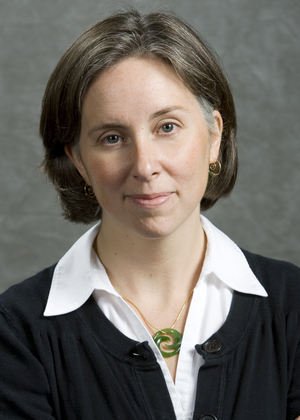
By Andrew Cohen
Two facts jumped out to Ann O’Leary ’05 when she agreed to help write and edit “A Woman’s Nation,” Maria Shriver’s project about the status of women in the United States.
First, it’s been nearly 50 years since the first expansive national project that centered on women. Second, by the end of summer women are expected to comprise the majority of American workers for the first time in history.
“That’s an amazing development,” says O’Leary, executive director of the Berkeley Center on Health, Economic & Family Security (Berkeley CHEFS). “The timing coincides well with our project and gives us a great chance to shine attention on whether our society fully supports women who have dual roles as workers and family caretakers.”
Partnering with The Center for American Progress and the University of Southern California’s Annenberg Center on Communication Leadership and Policy, “A Woman’s Nation” will examine the changed economic status of American women—and the consequences of that shift across our major institutions. Time magazine will also take part in research, reporting, and co-presenting discussions and roundtables around the country.
A preliminary report will be rolled out in October during Shriver’s annual California Women’s Conference, kicking off a multi-year endeavor.
O’Leary is one of just two co-editors of the report, which will be followed by a book that explores regulatory, legislative, business, and cultural changes needed to align with the needs of American women and families. The report will include research data from a national poll and interviews with women’s movement icons and other prominent leaders.
A veteran television news reporter and the wife of California Governor Arnold Schwarzenegger, Shriver knew that the first large-scale study on women was conducted in 1961. Her uncle, President John F. Kennedy, appointed Eleanor Roosevelt chair of the first commission to report on women in America.
“Maria talked to the Obama Administration, which recently created the White House Council on Women and Girls to look at government’s role in addressing their needs,” says O’Leary. “She thinks this new project will complement the White House Council, reveal important facts, guide legislators on key women’s issues, and be a great addition to the California Women’s Conference.”
Berkeley Law’s Prominent Role
O’Leary and Berkeley Law professor Mary Ann Mason, a co-director of Berkeley CHEFS, are among the group of scholars chosen to pen a specific chapter for the report. Berkeley Law students Eleanor Blume ’10, Tracy Petznick ’11, and Zoe Savitsky ’11 are also working on the project.
Author of the 2007 book “Mothers on the Fast Track: How a New Generation Can Balance Family and Careers,” Mason will outline how sectors such as law, medicine, academia, and journalism have fared at retaining and advancing women.
O’Leary is writing a chapter on the government’s role in supporting women who are both workers and caretakers. “People think of the Family Medical Leave Act,” she says, “but there are bigger social policies like Social Security and taxes that tend to favor traditional families with a male breadwinner and a wife who stays home to care for children. We need to examine the impact of these policies on all working families.”
Most married-couple families now have two wage earners, a growing number of families are headed by a single working parent, and more men are filling caretaker roles for children and elderly parents than ever before. But in many ways, notes O’Leary, our culture and institutions have not adapted to this reality.
“Women are increasingly becoming the primary bread-winner or contributing more to the family income,” she says. “We want to examine what this means for government policies, business employers, education workers who prepare people for jobs in the future, and religious institutions where women have been traditionally active.”
While “A Woman’s Nation” won’t conduct new empirical research just yet, O’Leary says chapter authors will review existing laws and research “through the lens of our recently changed economy. Our hope is to walk away with a new understanding of where we need to update social policies and how businesses can best update their practices.”
By promoting an updated definition of what women most need from America’s economic, cultural, and social institutions, Shriver’s group aims to seize the attention of both Congress and the Obama Administration.
“This project will focus some media attention on important research that already exists but hasn’t yet drawn the spotlight,” says O’Leary. “We think it can benefit women by helping to improve some of these core institutional practices.”